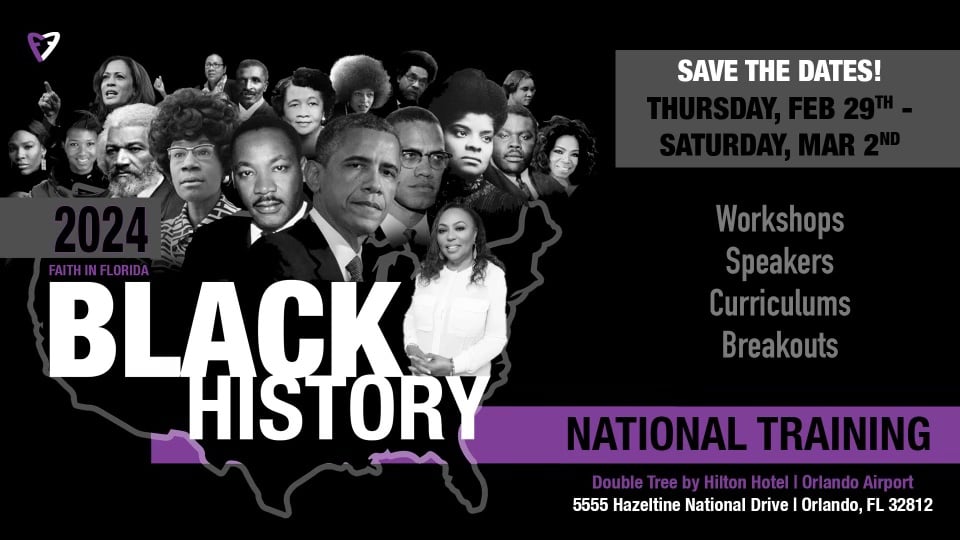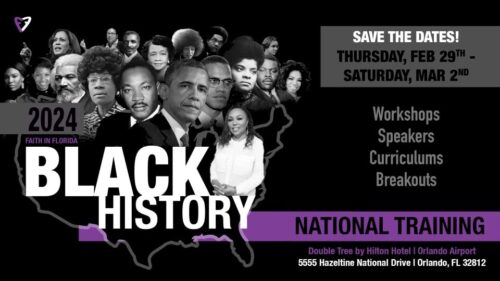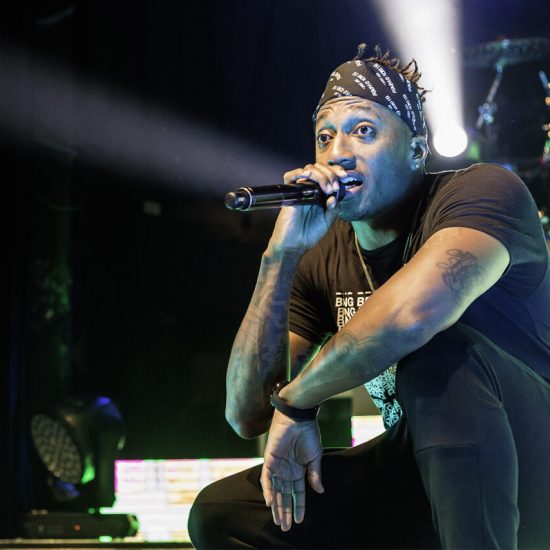
(RNS) — Faith leaders in Florida and their supporters are redoubling efforts to ensure Black history is taught widely and truthfully in reaction to the state’s rejection of an Advanced Placement course on African American studies and changes to state academic standards about public school history instruction about slavery.
Starting Thursday (Feb. 29), leaders of Faith in Florida, who last year created an online toolkit for churches wanting to teach Black history, will meet in Orlando for a training session with Florida educators and others to share how they have used it.

Flyer for the Faith in Florida Black History training sessions. (Image courtesy Faith in Florida)
In the same week, Black Baptist clergy, scholars, and curriculum publishers organized by the Florida General Baptist Convention will meet at a church in Tallahassee for a symposium called “Teaching Our Own History.” The participants intend to review a curriculum outline they hope will be used in schools and churches across the state.
“Our march is not for a moment but it’s for a movement,” said the Rev. R.B. Holmes Jr., pastor of Tallahassee’s Bethel Missionary Baptist Church and host of the two-day symposium set to begin on Monday.
The developments come after state social studies authorities suggested that lessons about slavery in America could include “how slaves developed skills which, in some instances, could be applied for their personal benefit.”
Holmes said in an interview that Baptist leaders plan to present their model for teaching African and African American history as an alternative to the “hurtful” state curriculum and will share details of it with state government officials at the conclusion of the symposium.
“We will present to the governor of Florida, the Commissioner of Education, and the Board of Education a factual, accurate, and correct teaching of African American history in our public schools,” Holmes said in a statement. “An enslaved people didn’t derive any benefits from slavery; slavery was brutal, treacherous, sinful and unscrupulous.”
The Rev. Carl Johnson, president of the Florida General Baptist Convention, said the new curriculum guide will be available statewide starting in 2025 and he hopes other Baptist state conventions affiliated with the National Baptist Convention, USA, will follow its model.
“Our primary goal is to dispel any myth that’s not accurate about our history,” he said in an interview. “We’re crafting information to correct those misnomers.”
Leaders of the “Teaching Our Own History” task force said more than 50 churches and organizations have committed to using the curriculum guide at “freedom schools” organized to teach Black history, following a model created during the Civil Rights Movement of the 1950s and ’60s that provided academic enrichment and trained students about social change.
The 2023 Florida education statutes allow public school teachers to discuss “the development of slavery, the passage to America, the enslavement experience, abolition, and the history and contributions of Americans of the African diaspora to society.” But they say instruction “may not be used to indoctrinate or persuade students to a particular point of view inconsistent with … the state academic standards.”
Dana Thompson Dorsey, an associate professor of education law at the University of South Florida who chairs the Baptist leaders’ curriculum committee, said the outline includes Black inventors such as Garrett Morgan, who created the yellow caution light in the traffic signal, and Otis Boykin, who created a crucial component of the pacemaker.
“We’re trying to just make it easier and less stressful for teachers to teach information that they can include in every course that they teach even if they are not a history teacher,” Thompson Dorsey said.
“It may include inventors, or it may include different calculations or something that has been created by Black mathematicians,” she said.
The Rev. Frederick D. Haynes III, president of the Rainbow/PUSH Coalition, is scheduled to preach at a “Save Our History” revival during the evenings of the Tallahassee symposium.
“I’m so proud of my colleagues in the state of Florida who have decided to take this situation into their own hands and actually do something about it,” he said in an interview, adding that he hopes their work could be replicated by others across the country.
“There is a real concern that there are some in this nation who are determined to make us just blind to a rich history that is a part of American history. And it does us no good when we turn our backs on a rich history that really needs to be shared and told,” he said.
Faith in Florida, a consortium of Florida leaders, is working to advance Black history, particularly through churches. In May of 2023, the multiracial and multifaith coalition of congregations launched an online toolkit to encourage Florida churches to teach Black history.
As of October, leaders of more than 300 congregations — mostly pastors of Black churches — from 22 states had pledged to join in the cause. That number has grown to more than 400 congregations in Florida and 28 other states and includes leaders from predominantly white and Muslim communities.
“People across the state and across the country want to know: How do we do more? How do we escalate this teaching?” said the Rev. Rhonda Thomas, executive director of Faith in Florida.
“What’s so important for us, and this convening, is making sure that we continue to teach history in its richness, in its fullness, teach it in ways that even educators wouldn’t be able to teach, because we don’t have a restriction in the church,” she said.
Both of the training sessions — the first in Tallahassee and the second in Orlando — will include curriculum companies whose products could enhance Black history instruction, organizers said.
Thomas said Holmes and his team have her organization’s support. The Florida General Baptist Convention is a partner of Faith in Florida, and some of the churches involved in the Tallahassee symposium are active members of her organization.
“We definitely do not look at it as a competitive thing, but we see how it’s going to take all of us to work together as one to make sure that Black history is taught in its fullness, in a way that it’s not diluted,” she said.
Ahead of the upcoming meetings, Thomas said she has already noticed the difference the church-based focus on Black history has made in some of Florida’s congregations.
“We have seen across the state how teaching Black history has become its own identity,” she said, “and now some of our Black history classes are larger than our Sunday school classes.”






